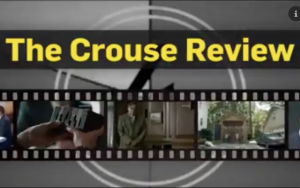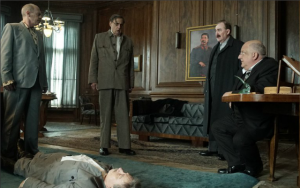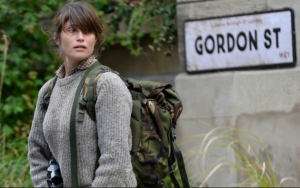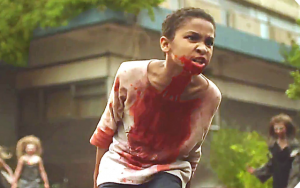There are as many kinds of cinematic zombies as there are zombie movies. From George A. Romero’s lumbering brain eaters and the fast-moving fleshbags of 28 Days Later to the undead hordes of World War Z and The Crazies’ sentient creepers, the only thing that binds them is an voracious urge to eat their living counterparts and, these days, an almost unrivalled popularity with horror fans.
It seems when the world is in turmoil people turn to zombies as an outlet for their apocalyptic anxieties. A new British film, The Girl With All the Gifts, borrows from Romero, 28 Days Later and even from The Walking Dead and yet its mix of social commentary, zippy zombies and exploding skulls doesn’t feel like a re-tread.
“The zombie metaphor is humanity eating itself,” says star Gemma Arterton. “This film extends that because it gives zombies, or hungries as we call them, intelligence, empathy, love and the ability to fend for themselves in a more developed way.
“I think we are in a period of time right now where there is major despair out there about what is happening. This film is poignant now, coming out now post Brexit. It feels quite relevant.”
Arterton plays Helen Justineau, teacher of a group of children infected by a zombifying disease but still capable of advanced thought. In the search for a cure these kids are studied at a remote English army base.
Helen has bonded with one remarkable child, Melanie (Sennia Nanua), a youngster as lethal as the others but possessed of superior intelligence and charm. When the base is overrun by “hungries” Helen, Melanie and two others escape but not before the child shows her true colours.
“I did something bad,” she says. “I ate bits of the soldiers.” With the help of the world-weary Sgt. Eddie Parks (Paddy Considine) they make their way to London.
“If you talk to Mike Carey who wrote the book and the screenplay,” says Arterton, who broke out as an MI6 field agent in 2008’s Bond hit Quantum of Solace, “you’ll find he’s not only a great raconteur but he really knows what’s going on with science and politics and he mixes the two together. It is such interesting conversation. He’s obviously a big geek but in a really factual way.”
A case in point, Arterton says, is the virus that lies at the centre of the film.
“The disease, the fungal infection is actually something that exists. There is a colony of ants in South America that have Ophiocordyceps unilateralis,” she explains, diving into the science. “It’s a fungal infection that infects them from the inside and then they sprout and turn into a different type of ant. Then those ants will eat the other ants to survive.
“These things happen in nature. Nature is such a strong force. I love that in this film you can see nature taking back the planet.
“We actually used some shots from Chornobyl as the London skyline because
Chornobyl is this abandoned city that is completely overgrown now. We might die, but nature will be fine. The world is going to keep going without us.”
Helmed by Scottish director Colm McCarthy in his first feature-length production, The Girl with All the Gifts asks difficult questions about the price of survival, capping off the story with chilling words that may — or may not — alleviate lingering zombie phobia.
“It’s not all over,” says Melanie, “it’s just not yours anymore.”
 Richard joins CP24 to have a look at the weekend’s new movies including “Tomb Raider,” the dark comedy “The Death of Stalin,” the old folks road trip “The Leisure Seeker,” the crime thriller “7 Days in Entebbe” and the Cecil Beaton documentary “Love, Cecil.”
Richard joins CP24 to have a look at the weekend’s new movies including “Tomb Raider,” the dark comedy “The Death of Stalin,” the old folks road trip “The Leisure Seeker,” the crime thriller “7 Days in Entebbe” and the Cecil Beaton documentary “Love, Cecil.”







